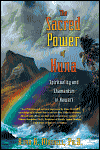
I have a friend who is a Gardnerian 3rd degree high priestess who’s been studying huna—Hawaiian wisdom, magic, shamanism—for twenty years. I always wondered why on earth she was studying something so non-Wiccan. Now that I’ve read The Sacred Power of Huna, I get it. Everything is connected. Power is sacred, changing, always becoming. Magic is not only possible but likely.
It would be easy to say that huna and Wicca are the same thing, that they’re both nature religions whose practitioners work with sacred energy. That is not precisely true. They are separate systems, developed by people who live thousands of miles apart, but it is safe to say that the two systems are similar enough that the primary differences lie in geography and nomenclature. But Rima Morrell, whose Ph.D. is from Cambridge University, doesn’t seem to be aware of this. Although she refers to Scott Cunningham’s 1994 book, Hawaiian Religion and Magic, the words “pagan,” “witch,” and “Wicca” are not in her index and all of her comparisons and references are to the standard-brand religions (plus Buddhism).
So why is this book of interest to pagans? We who so famously “worship the ground we walk on” hold much in common with Hawaiians who are preserving and reviving their ancient religion. We and they focus our consciousness to work magic. We and they believe that the goddesses and gods are alive and magic is afoot. We believe that everything on the planet is infused with spirit. We know that reality is more than it looks like, that facts are often the opinion of the majority or the winner, and that paradigms sure do shift. Even after we’ve done our year and a day, we keep on learning. The Sacred Power of Huna should be on our reading list. (Just don’t pay a lot of attention to some of Morrell’s assumptions about the Judeo-Christian god.)
The practice of magic, Morrell writes,
is certainly not confined to Hawai’I and not even to the kahuna … although they are famous for their mastery. … [T]he keys to being able to ‘make magic’ are to be aware of our interconnectedness with the substance of all and to generate power by focusing the great light of our being. The free-floating silver pieces of aka, the stuff of which the universe is made, do not possess mana in themselves. They are like a circuit whose electrical current hasn’t been switched on; in fact, the lines of the circuit first have to be connected by the practitioner. … It is possible for all of us to transform our aka into akua [the gods and goddesses of huna] if we learn how to activate our consciousness. … That’s why creativity is so important. … Creativity is how we liberate ourselves from our habitual structures and familiar choices (pp. 82-83).
With a different vocabulary, this could be Wicca 101.
Morrell also describes the three minds of huna: the subconscious (‘unihipili), the conscious (‘uhane) and the superconscious (‘ammakua), which is most of us are separate and independent of each other. Starhawk describes the Talking Self, Younger Self, and High Self of the Feri Tradition of Wicca. “Balance is necessary,” Starhawk writes. Morrell teaches the same lesson.
Finally, Hawaiian wisdom also looks a lot like process philosophy, or theology, which is best explained in Carol P. Christ’s book, She Who Changes (Palgrave Macmillan, 2003). In her chapter on “making magic,” Morrell writes:
There are a whole flock of gods and goddesses … who are constantly creating the world, together with humans and the rest of creation-in-motion. These gods and goddesses have recognizably human qualities: one god can be vain, another can be jealous, and a particular goddess loves dancing. This is very different from the concept of an all-powerful God who knows everything and is responsible for having created everything. In Hawaii the qualities of the gods are seen as being reflected in the world that humans and gods co-create. … If we are able to see the forms of the gods and goddesses in the clouds, tune in to the spirit of our computer and smile at the fairies in the garden, then the world will clearly sing—at least for us (pp. 80-81).
This is why pagans should read The Sacred Power of Huna.
~review by Barbara Ardinger, Ph.D.
Author: Rima A. Morrell, Ph.D.
Inner Traditions, 2005
